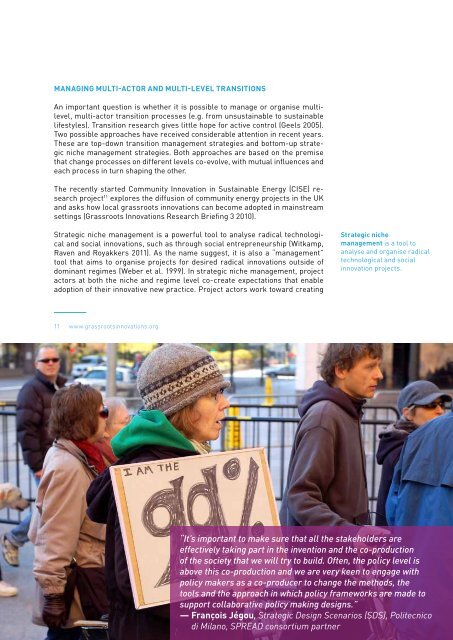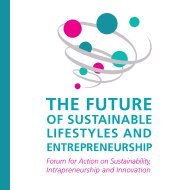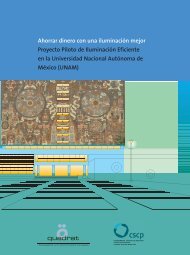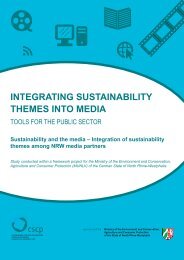today's facts & tomorrow's trends - SPREAD Sustainable Lifestyles ...
today's facts & tomorrow's trends - SPREAD Sustainable Lifestyles ...
today's facts & tomorrow's trends - SPREAD Sustainable Lifestyles ...
You also want an ePaper? Increase the reach of your titles
YUMPU automatically turns print PDFs into web optimized ePapers that Google loves.
Managing multi-actor and multi-level transitions<br />
An important question is whether it is possible to manage or organise multilevel,<br />
multi-actor transition processes (e.g. from unsustainable to sustainable<br />
lifestyles). Transition research gives little hope for active control (Geels 2005).<br />
Two possible approaches have received considerable attention in recent years.<br />
These are top-down transition management strategies and bottom-up strategic<br />
niche management strategies. Both approaches are based on the premise<br />
that change processes on different levels co-evolve, with mutual influences and<br />
each process in turn shaping the other.<br />
The recently started Community Innovation in <strong>Sustainable</strong> Energy (CISE) research<br />
project 11 explores the diffusion of community energy projects in the UK<br />
and asks how local grassroots innovations can become adopted in mainstream<br />
settings (Grassroots Innovations Research Briefing 3 2010).<br />
Strategic niche management is a powerful tool to analyse radical technological<br />
and social innovations, such as through social entrepreneurship (Witkamp,<br />
Raven and Royakkers 2011). As the name suggest, it is also a “management”<br />
tool that aims to organise projects for desired radical innovations outside of<br />
dominant regimes (Weber et al. 1999). In strategic niche management, project<br />
actors at both the niche and regime level co-create expectations that enable<br />
adoption of their innovative new practice. Project actors work toward creating<br />
Strategic niche<br />
management is a tool to<br />
analyse and organise radical<br />
technological and social<br />
innovation projects.<br />
11 www.grassrootsinnovations.org<br />
“It’s important to make sure that all the stakeholders are<br />
effectively taking part in the invention and the co-production<br />
of the society that we will try to build. Often, the policy level is<br />
above this co-production and we are very keen to engage with<br />
policy makers as a co-producer to change the methods, the<br />
tools and the approach in which policy frameworks are made to<br />
support collaborative policy making designs.”<br />
— François Jégou, Strategic Design Scenarios (SDS), Politecnico<br />
di Milano, <strong>SPREAD</strong> consortium partner<br />
A framework for change 99
















